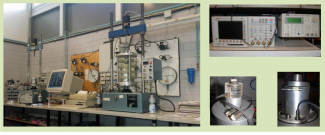Geotechnical Lab
The Laboratory has more than thirty years of activity and since its establishment instruments and experimental techniques, have been subject to continuous evolution and upgrade. Currently the laboratory has two locations, one in Bari and a newer second, at the Taranto branch of the Technical University of Bari. The laboratory has adequately equipped to perform tests at controlled load path, under axisymmetric deformation condition, with continuous monitoring of stress-strain state, even locally (on-sample). Such mechanical testing, may be performed on specimens different sized, consistent with the appropriate representative volume element (REV). The experimentation may be performed at pressures from low to high (10 MPa), so that we can investigate the mechanical behaviour of soils at state from extremely firm up to weakly cemented, or otherwise investigate the evolution of the material behaviour in various stages of its structure development, natural or reconstituted. The "stress-path" devices are also equipped with instrumentation for the measurement of shear stiffness of the soil in the elastic range, associated with very small deformations, statically, by means of local displacement transducers, whereas dynamically, using the technique of bender elements. The equipment enables the investigation of the character of anisotropy of the elasticity of the material, which is intrinsic anisotropy evolutionary. With such equipment it is also possible the investigation of the soil behaviour in compression and in extension. For the investigation of one-dimensional compressibility of the soil, the laboratory is equipped with numerous standard oedometers (maximum pressure up to 18 MPa). The laboratory has equipment for performing conventional direct shear test. There are also two apparatus to perform the ring shear test, useful for the measurement of the residual strength. Beside the conventional equipment for the assessment of the parameters of permeability and consolidation of soils, recently instrumentation has been developed for the investigation of the hydraulic retention properties of the soil, with the change of the degree of saturation, throughout drying-wetting cycles. Is available a special "tank" designed for physical modelling of infiltration processes mono / bi-dimensional, assigned to boundary conditions: it is equipped with appropriate slots along verticals for the insertion in the soil of tensiometers (or other another type of probe), with the aim of monitoring the matrix suction (or another parameter), with the proceed of infiltration. In the laboratory facilities are available that allow the experimental studies of mechanical stabilization techniques of marine dredging sediments by means additives. The laboratory was recently equipped, for the classification and the mechanical characterization of contaminated soil.
